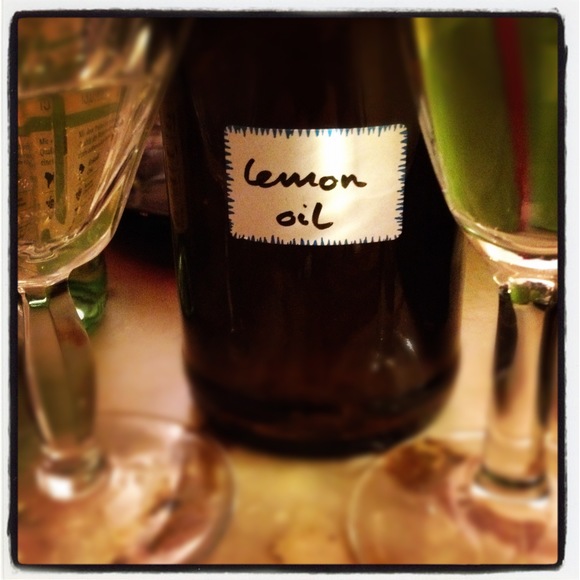|
Various essential oils are known for a variety of medicinal and aromatherapy properties. Lemon essential oil is no different. In fact, more uses are being discovered all the time. Here are ten of the most common household and medicinal uses for lemon essential oil, accompanied by instructions on how to use the oils for each. Orange oil and other citrus oils have some of the same uses as lemon oil. However, lemon oil seems to be more effective.
Respiratory Ailments Lemon essential oil can be used in conjunction with a steam inhalation treatment for wheezing, colds, cough, and other upper respiratory problems. Note that this should not be used in those with asthma. To take a steam inhalation treatment with lemon essential oil, fill a large bowl or pan with boiling hot water and a few drops of lemon essential oil. Place the afflicted person's head over the bowl and then place a towel over the head and bowl (in a tent-like fashion), so that no steam escapes. The person should take a few deep breaths, breathing the vapors in deeply for a couple minutes. If at any time, the treatment causes you to feel uncomfortable, stop right away. Be careful to not get burned by the water from spills or beng too close to the bowl. As with any medical treatment, contact a licensed medical professional before starting any medical treatment. Disinfectant Lemon is a disinfectant and can be used as a deodorizer, neutralizer, and air sterilizer. Simply add a few drops of the lemon essential oil to a spray bottle filled with water. The same concoction can also be sprayed onto tables, counter tops and other surfaces. Test an inconspicuous area on the surface before use by adding a small amount and waiting 24 hours for the effect (if any). The oil can be good for many surfaces, but it also could damage some. Mouthwash Lemon essential oil can be used as a mouthwash. Add a couple drops to a 4 oz glass of water and gargle. The disinfectant properties are great for germs in the mouth and for neutralizing bad breath odors, as well. Energy For a quick, refreshing energy boost, combine a couple drops each of lemon essential oil and peppermint essential oil in a glass of water and drink up. Insect Repellent Put a few drops of lemon essential oil in a spray bottle filled with water and spray onto the skin as an insect repellent. However, do not use this repellent method in the sun. Lemon oil can do damage to the skin if the treated skin is exposed to the sun. Avoid sun exposure for 12 hours after applying lemon essential oil to the skin. This method is best used at night or on cloudy and cool days. Heartburn Add a couple drops of lemon essential oil to a glass of water. Drink the full glass. This is said to relieve heartburn symptoms by neutralizing the acid. Cough, Sore Throat, and Fever Adding a couple drops of lemon essential oil to your glass of water can help soothe a sore throat, calm a cough, and quell a fever. Lemon oil fights against bacteria, as well as viruses. There aren't many substances around that can do both. Many will do one or the other. Hair, Skin, and Nails Lemon oil can be used to fight against oily skin and hair. It also has cleansing properties and is often an ingredient in homemade hair products. One thing to keep in mind with using lemon in the hair is that if you go into the sun, the lemon oil might react in such a way that it lightens your hair up a bit. In my experience, this can make for some good highlights, if applied in the right manner. Lemon oil is also great nourishment for the nails and can help fight against nail fungus. Anxiety Lemon essential oils are often used in aromatherapy, specifically for anxiety and depression. Memory & Thought Clarity Lemon essential oil, when used in combination with rosemary may help increase memory, increase concentration, and provide more clarity of thought. To create this helpful blend, use 3 drops of rosemary, 3 drops of lemon oil, and diffuse it. * The author is not a medical professional. Before using any treatments, natural or not, a licensed medical professional should be consulted.
0 Comments
When you hear the word "fungi", you may automatically think of something negative. There are many harmful types of fungi, so assumptions are often made that fungi is always going to be a bad thing. Fortunately, that isn't always the case, especially when it comes to gardening. Here are some ways to use fungi that are actually beneficial for your garden.
Mycorrhizal Fungi, also known as mycorrizhae, is extremely beneficial to the plants in your garden. In an undisturbed growing environment, such as a deep forest, mycorrhizae is naturally present. However, in residential areas or areas in which the land has been disturbed by human life, it is not as prevalent. Mycorrhizae help the plants thrive by providing an environment in which the plants can access the nutrients from the soil. Micorrhizae are actually natural soil fertilizers. Using natural fertilizers can provide your garden with the mychorrizal fungi that is needed. Some minerals and nutrients can only be accessed this way. Root Shield is one type of natural beneficial fungus fertilizer. To use it, just mix it with the recommended amount of water according to the size of your garden and sprinkle the entire garden with a watering can. Some ant species use certain fungi to their benefit to gain access to important nutrients they otherwise would not be able to get. They create little miniature "gardens" of this fungi. The fungi then soaks up this nutrient and the ants feed on the fungi. It is a good idea to keep ants in your garden, rather than get rid of them with harmful chemical pesticides. Not only are the chemical pesticides bad for you, as well as your garden and the Earth, but many ants are good for your garden. They protect plants and even kill off the insects that do harm to plants. The ants actually do all of this themselves naturally, so there isn't necessarily anything for you to do but make sure you aren't killing off the ants and be sure you have the type of ants that do this. Different ant species can be ordered live through ant farms. Speaking of pesticides, some pesticides can be beneficial to your garden, such as natural pesticides. Some natural pesticides are made from beneficial fungi. These are generally sold as a mixture to be added to your regular fertilizer treatment, unless your fertilizer already contains mychorrizhal compounds. Follow the directions of your specific beneficial fungi pesticide when applying it to your garden. Another use for beneficial fungi in your garden is as a natural weed killer. Beneficial fungi can kill off harmful weeds so that the plants that should be thriving will have the space they need to grow. Weeds can also suck away all the nutrients, leaving the other plants starving. The beneficial fungi contained in natural microbial fertilizers containing mychorrizhal compounds, such as mentioned above, also serve as an agent against harmful weeds. Beneficial fungi can be used to kill off harmful fungi in your garden as well. The application of the fertilizer, such as RootShield, containing mychorrizhal compounds should be helpful in keeping harmful fungi away. Vinegar is most commonly used in recipes, but were you aware that it has other benefits as well? Here are ten great uses for vinegar that you may not have thought about before. These are tailored toward regular distilled white vinegar.
Use Vinegar as a Bleach-Free Laundry Disinfectant Do you dread using bleach to disinfect your clothes? Maybe you can't stand the smell or it makes you sick. Try using one half cup of vinegar and one fourth cup of baking soda along with your detergent in your load of laundry. It whitens, brightens, cleans, and disinfects your clothes. Plus, it's much safer for the environment. Another bonus is that vinegar can be used on all colors. It's much less expensive than color-safe bleach, totaling about $1.50 per gallon versus 4 or 5 times that for color-safe bleach. Use Vinegar to Clean the Fish Bowl or Tank Do you have a fish tank or bowl with glass that is brown in some areas? When you clean the fish's residence, put a generous amount of vinegar on your cleaning cloth with a dab of liquid dish soap. The vinegar clears away the residue and disinfects the tank. The combination of the vinegar and dish soap makes it easier to slide the cloth around. Your fish will finally be able to see you through his glass and you don't have to be embarrassed at a tank that looks as if its never been cleaned. Vinegar Makes a Great Window Cleaner Are you tired of spending money on expensive window cleaning sprays? Just get yourself a good water bottle. Then, fill it about two-thirds of the way with water. Next, put about 3 drops of liquid dish soap into the water. Finally, fill the remaining area with vinegar. Shake it a little bit. Let it sit for a few minutes and then voila! Now you have a really good window-cleaning solution that costs less than a candy bar to refill and gives you a great streak-free clean for your windows and mirrors. I suggest keeping one in each bathroom, one in the kitchen, and one in each vehicle. With them in reach, you'll never have streaky, dirty windows and mirrors again. Use Vinegar to Clean Moldy Tupperware Does your husband tend to leave moldy storage containers and dishes in his work truck? Or maybe you leave it in the fridge too long. That's okay. Just empty them outside and bring them on in. Place them open in the sink. Put a dab of liquid dish soap in each one. Then, put about 2 tablespoons of vinegar in each. Fill the rest of the way with hot water and let them soak. For the lids, fill the sink only high enough to cover them with a dab of dish soap and about one fourth cup of vinegar and the rest hot water. Once the lids and containers have soaked for at least 20 minutes, wash them as you normally would. I prefer to use the dishwasher as an extra disinfection/sterilization process. Clean Your Countertops With Vinegar Vinegar can replace your chemical-ridden kitchen counter cleaners. Just mix half vinegar and half water in a spray bottle. Spray the counters and wipe clean. You can also use hydrogen peroxide for this. If you like to see your cleaners soap up, just add a couple drops of dish soap to the solution. The vinegar disinfects the counters and takes away odors as well. If you have a really tough stain, put a dash of baking soda on top of it. Then, spray with your vinegar solution and wipe clean. If there is white residue, you need to spray and wipe the vinegar solution until it is gone. Vinegar Kills Fish Odors in the Microwave Do you like to steam your fish in the microwave, but hate the smell? Place a cup or bowl of vinegar inside the microwave with your fish. Don't cook the fish in it. It should be beside the container the fish is in. The vinegar absorbs the odor. Use Vinegar as a Deodorizer While Cooking This trick is good if you are cooking something that is particularly pungent in odor, such as chitterlings, fish, or fried foods. Boil a pan of vinegar diluted halfway with water. This will help to absorb the odors. Just remember to start it before you start the "stinky" foods. This also works if you are baking something and don't want the smell to go throughout the house. Vinegar Can Be Used to ease Heartburn If you suffer from gas or heartburn frequently, you'll want to try this one. Drink a tablespoon of vinegar right before each meal. It helps to dissolve the acids, so there won't be as much left for the heartburn to feed off of. Clean Your Refrigerator With Vinegar Cleaning your refrigerator with vinegar frequently helps to kill germs and keep it smelling fresh. Use the same solution used to clean the counters above. Use Vinegar To Ward off Stinky Feet This is the really odd one. Do you know anyone who has smelly feet? Most people know at least one person who suffers from this. The person can soak their feet in a tub that has half water and half vinegar. The vinegar takes away the smell, kills germs, and relaxes sore muscles. So, if you know anyone like this, you may want to hint about it. Try using the muscle relaxer part, though. You don't want to lose a good friend by telling them their feet stink, unless you have the kind of relationship where this conversation would be acceptable. Know of any other awesome uses for vinegar? Comment below! Hydrogen Peroxide is most commonly used to treat cuts and scrapes, but did you know there were many other uses as well? Even if you knew, aren't you curious to see how many you've tried and how many you haven't? Helpful Hints Before Using Hydrogen Peroxide Before using any of these, you should remember to always keep the peroxide in the dark container it comes in. Once it has been exposed to air and light, it loses some of its efficacy. It is best to use it straight from the bottle and right away after you take it from the bottle with a cloth or tissue. It's also important to remember to be safe with peroxide. If swallowed, it can be harmful and should be kept out of reach of children. Should accidental poisoning occur, you should contact a poison control center and possibly 911 immediately. If a large amount is swallowed, 911 should be called rather than poison control. This goes for adults as well as children. Ten Awesome Uses For Hydrogen Peroxide Mouthwash - Hydrogen Peroxide can be used as an alternative to mouthwash. It disinfects the mouth, freshens the breath, and whitens the teeth all in one step. Of course, you'll still need toothpaste, but you won't need your mouthwash anymore. This costs less and is more effective. Just ask your dentist or doctor about it and they're likely to agree. Use it every day right after each brushing and flossing. All you need is about a capful. Swish it around for 30 seconds, just like mouthwash. Don't rinse your mouth out afterwards. Countertop & Cutting Board Sanitizer - If you need to sanitize your countertops, hydrogen peroxide will do so, killing the germs and even salmonella. Fill a spray bottle with half water and half hydrogen peroxide, spray and wipe clean. Keep in mind that using this solution will discolor or damage some surfaces, so do a spot test in an inconspicuous area first and then wait 24 hours to see what happens. You can also use hydrogen peroxide as an effective means of sanitizing your cutting boards. It will kill salmonella and other harmful bacteria. Use the same solution as you would for sanitizing countertops. Toothbrush Rinse - Rinse your toothbrush with hydrogen peroxide before and after each use to keep it sanitary. Bleach Alternative - If you need an alternative to bleach, you can add 1/2 cup hydrogen peroxide to your load of laundry. It even gets out blood. Be careful, though because it really does bleach. Don't use it any dyed clothing, only whites. Fight Mold - Peroxide is effective against some toxic molds, but be aware that it doesn't kill germs from all of them, so it's best to leave it up to the professionals. However, I do recommend applying it in areas of your bathroom that are prone to mold, such as the cracks in the caulking of the bathtub and shower. Computer Keys & Screen - Peroxide is a great cleaner for your computer keys as well. It kills the bacteria and air dries quickly, so the equipment doesn't get damaged. While you're at it, it's also safe for the screen, outside of the computer, outside of speakers, and the outside of any other equipment. Bathroom Mirrors - Peroxide cleans the bathroom mirrors without leaving behind any smears, plus since it kills bacteria, you have the added benefit of knowing it's okay for your kids to kiss the mirror. Oh, come on, you know they love to do it. Treat Acne - You can use peroxide to treat acne as well. It's the main ingredient in most acne medicines and the other ingredients in them aren't necessary. Just apply it to the affected area once or twice a day and watch how quickly the acne disappears. Kill Bathroom Bacteria - You can keep a spray bottle of peroxide in the bathroom. Use it to spray the shower/tub, sink, and toilet area to keep away bacteria and viruses. Spray regularly. Clean Off Fruits & Veggies - You can use it to clean fruits and vegetables. Here's how: Fill your sink with cold water. Then, add 1/4 cup peroxide and some salt. Scrub the vegetables and rinse them. This kills any lingering viruses or bacteria. It also keeps the food fresher longer. If you don't have hydrogen peroxide in your cabinet, get some today! You're trying to relax in your zen garden when you start seeing dots. Wait, those aren't dots at all. Those are aphids and they are coming from the precious plants you have been giving love and care to. This is supposed to be your relaxation zone. Not to mention how your plants might be feeling about this unwelcome invasion. So, how do you get rid of these pesky aphids without dousing the poor plants with harmful chemicals? Below are 10 eco-friendly ways to rid, reduce, and prevent aphids, also called plant lice.
Neem Oil as a Natural Aphid Pesticide - Pure neem oil, an oil derived from the neem tree, has long been used in many natural remedies, including pest control. The oil, or Azadirachtin, acts as a repellent and growth regulator. To the insects, the neem oil has a bitter taste, so they will not eat the leaves treated with it. Also, if the insects do come in contact with the Azadirachtin, it prevents the larvae from growing into adults. Neem oil can be purchased at various online stores or made from neem trees. Homemade Lemon Spray to Get Rid of Aphids Naturally - This natural aphid pesticide works as an instant remedy, killing the aphids on contact. To make this natural pesticide, grate the rind of a large lemon. Boil it in enough water to fill a garden spray bottle. Let the mixture sit overnight. Drain the liquid into the garden spray bottle. Spray the aphids and larvae directly. It will cause them to convulse. Using Homemade Vinegar Spray as Defense Against Aphids & Larvae - Get out a spray bottle and fill it 1/3 of the way with distilled white vinegar and the rest of the way with water. This will kill the aphids and larvae on contact. Some plants react badly to the vinegar. It's important know which plants you can and cannot use this method with. Aluminum Foil is One of the Unexpected Natural Aphid Pesticides - Place a square of aluminum foil around the base of plants affected by aphids. This causes light to bounce around to the underside of the leaves, which repels the aphids. It is also good for the plants, as it brings them more natural sunlight. Calcium Powder is a Good Aphid Repellent - Sprinkling calcium powder around the base of the plants is another natural aphid repellent. The aphids do not like the calcium and will generally stay away from it. How to Use a Yellow Plastic Bowl to Trick Aphids - Aphids are naturally attracted to the color yellow. Place a yellow plastic bowl filled about 1/3 of the way with water in the center of the infested area. Many of the aphids will be drawn to the bowl and will go into the water and die. Banana Peels Repel Aphids Easily - Burying shredded banana peels around the base of plants is an odd, but effective remedy. It has been around for ages and many gardeners will swear by it. Smash Aphid Buddies as a Warning. It works! - Squashing a few aphids near the infested area will signify to the other aphids that it is time to go. It's a chemical reaction. Ladybugs Are an Aphid’s Enemy - Ladybugs can be purchased at garden and home improvement centers. The ladybugs feed on the aphids and if you purchase enough, the aphids will be gone in no time. Ladybugs are also good for the garden in other ways. Garlic or Onions Are an Aphid Deterrent - Planting garlic or onions is another natural aphid deterrent. They do not like garlic or onion and will not likely come near an area they are in. *I originally published this via Yahoo Contributor Network |
LIfe & Home Journal
Archives
January 2024
Categories
All
|
- Brand Shamans
- Brand Healing
- Inner Healing
-
INTENT-SIVE NATURE
- Content & Brand Elevation
- Healing Jewelry & Talismans
- Bath, Beauty, & Self-Care
- Healing Sessions
- Rituals, Herbs, & Altar Supplies
- Gawwwdess Baby Boutique
- Soul Flame Gifts
- Yoga & Meditation
- Books & Media
- Education & Homeschool Resources
- Home, RV, & Decor
- Clothing
- Pets
- Custom Orders
- Monthly Subscription Boxes
- October Festivals
- FLOW-Key Parenting
- About & Contact
- RV, Nature, & Travel Shamans
- Souls Within
- Life & Home
- Heart 'N Mind Homeschool
- The Homeschooling Mommy
- Books & Authors
- Speak Up!
- Pawsitive Pet Parenting
- Manifesterz
- Gifts In Minutes
- Brand Shamans
- Brand Healing
- Inner Healing
-
INTENT-SIVE NATURE
- Content & Brand Elevation
- Healing Jewelry & Talismans
- Bath, Beauty, & Self-Care
- Healing Sessions
- Rituals, Herbs, & Altar Supplies
- Gawwwdess Baby Boutique
- Soul Flame Gifts
- Yoga & Meditation
- Books & Media
- Education & Homeschool Resources
- Home, RV, & Decor
- Clothing
- Pets
- Custom Orders
- Monthly Subscription Boxes
- October Festivals
- FLOW-Key Parenting
- About & Contact
- RV, Nature, & Travel Shamans
- Souls Within
- Life & Home
- Heart 'N Mind Homeschool
- The Homeschooling Mommy
- Books & Authors
- Speak Up!
- Pawsitive Pet Parenting
- Manifesterz
- Gifts In Minutes






 RSS Feed
RSS Feed




